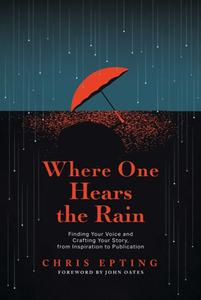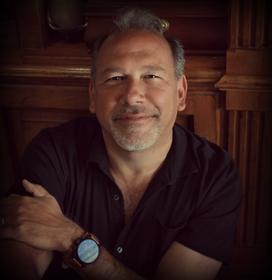 Chris Epting is the author of Where One Hears the Rain: Finding Your Voice and Crafting Your Story, from Inspiration to Publication, to be published tomorrow, August 20, by Permuted Press.
Chris Epting is the author of Where One Hears the Rain: Finding Your Voice and Crafting Your Story, from Inspiration to Publication, to be published tomorrow, August 20, by Permuted Press.
His career as a writer was given an early, most unusual assist--by legendary fiction writer John Cheever, a neighbor in Ossining, N.Y., to whom he reached out when he was about 12. Epting remembers, "Today, as a memoirist, I often reflect on the valuable lessons he imparted to me, which have become a significant influence in my writing. It is surreal to think back on the time I spent with him and the impact it has had on my work." Cheever even influenced the title of Epting's new book with his quote: "For me a page of good prose is where one hears the rain. A page of good prose is when one hears the noise of battle... A page of good prose seems to me the most serious dialogue that well-informed and intelligent men and women carry on today in their endeavor to make sure that the fires of this planet burn peaceably." In his new book, Epting remembers meeting and getting to know Cheever and his insights into writing:
I had decided early on that I wanted to be a writer. I had written a short story that truly impressed my fourth-grade teacher, Ms. Tina Rinaldi, to the point where she notified my parents and suggested they encourage me in this arena--and even mentioned it to a couple of other teachers. (Ms. Duff, my fifth grade teacher, I remember, got very excited.) For me, having a teacher become that invested in something I'd done was significant--and its effect lasts to this day. From that moment on, I was set. Come hell or high water, I was determined to be a writer. (A fallback I'd use many times when things like math grades suffered: "Hey... who needs math?... I'm gonna be a writer.")
My parents were fine with the fact that I wanted to be a writer by the time I was nine years old. A couple of years later, after watching me write regularly outside of school, my father suggested I take it a step further by dropping a note to a man who lived down the road--a writer named John Cheever--to see if he could offer me any advice. I had never heard of John Cheever, but I did know that my father had a couple of his books stacked on a shelf next to other famous authors, like Hemingway and Steinbeck. So I did. I wrote a few simple sentences to this man I'd never heard of, asking for some guidance. My mom drove me down Spring Valley Road (until it became Cedar Lane) and I placed the note in a large silver mailbox clearly labeled "Cheever."
Then, just a few days later, I got a neatly typed note that has been committed to memory since I opened the envelope:
Dear Chris Epting:
It is nice to know that there is another writer living in the neighborhood. I will call you one day soon and then maybe we can take a walk and talk about writing.
(signed)
John Cheever
 |
|
| Chris Epting | |
I could tell from my parents' reaction that this was a big deal. (There's something about seeing adults get genuinely excited, acting almost like kids, that impresses a young person. It feels incongruous, but in a good way.)
Several days after receiving his reply, the phone in our house rang. My mom said it was for me and I could tell from the look on her face that it was not one of my pals--John Mungo or Tommy Monohan--calling. She watched intently as I took the receiver.
"Hello?"
"Yes, Chris..." a rich, weathered, weary (vaguely British?) New England–accented voice began. "Hello, Chris. This is John Cheever."
With that, I was introduced to one of the greatest fiction writers in American literary history.
It starts, as I recall, with me eagerly listening one day as he shared some of his experiences teaching at the prestigious Iowa Writers' Workshop. Mr. Cheever spoke about how he would occasionally, while teaching at colleges, take aside young writers and ask them a simple but profound question: "Why are you here?" He explained that he was searching for a particular answer, one that set apart the truly dedicated and passionate writers from the rest. He told me that many aspiring writers would talk about their love for writing, their aspirations to become authors like him, and their excitement for the craft. However, he confessed that he wasn't interested in those answers. Instead, he listened intently for a different response. He wanted to hear some variation of, "I'm here because I have to write."
Mr. Cheever emphasized the significance of this distinction. He explained that when writing becomes a necessity--when it is as essential to one's being as eating, sleeping, or breathing--it sets writers apart. It becomes an integral part of their psyche, an ingrained compulsion that they cannot ignore or resist.
John Cheever's study was a sanctuary of creativity. The room exuded an air of quiet contemplation and intellectual energy. I couldn't help but be in awe of the well-oiled machinery of his writing life. The walls were lined with bookshelves that were filled to the brim with volumes of literature I had only dreamed of reading. A typewriter sat prominently on his desk--a testament to the bygone era of writing before the rise of computers.
When we sat down together, Mr. Cheever would take out my stories, his red felt-tip marker poised to make notes in the margins. His feedback was invaluable, and I hung on to his every word. He would offer suggestions and insights that transformed my writing, urging me to dig deeper into my characters or to create more evocative descriptions. "Make her more mysterious," he would say, or "Describe the flowers in the garden, and as they are dying, let that serve as a metaphor for the relationship." His guidance breathed life into my stories, adding layers of complexity and nuance that I had never considered.
During these sessions, there were moments of silence. Mr. Cheever would light cigarette after cigarette, the smoke curling lazily in the air as he gazed out the window, lost in thought. I marveled at the weight of his contemplation, knowing that I was witnessing a glimpse into the mind of a true storytelling master.
Occasionally, our conversations would veer off into other topics, like baseball or current events. These casual exchanges provided a glimpse into the man behind the writer--a person with a wide range of interests and a genuine curiosity about the world. It was during these moments that I realized the importance of being well-rounded and knowledgeable in order to enrich one's writing.

